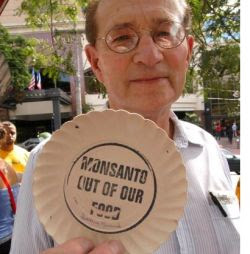Twenty years ago I wrote that family farms in Canada were at a pivotal point in their evolution. Farmers could continue growing crops based on the corporate agenda or they could lessen their ecological impact by adopting a model that encouraged eating local, in-season, organically grown indigenous foods. Consumer buying power was imperative to changing the way food was grown and distributed. Ironically, very little has changed.
Canadians have developed a sense of entitlement when it comes to buying cheap food. What’s really needed are consumers who recognize they have a duty to ensure fairness within the marketplace. This begins with paying farmers a reasonable price for the food they produce and extends to buying food that is produced in an ecologically responsible way.
In our quest for cheaper food, we play into the hands of multinational corporations. By doing so, we fail to realize the real cost of the food that we’re consuming. We benefit from low-priced food today at the expense of our food security tomorrow. A country that is unable to feed itself is a nation on the brink of losing self-determination.
Food security can only be maintained when prices reflect the true cost of production and when local farmers are free from undue pressures to grow cash crops for export or biofuels. That’s why it’s important to consider the political, social, economic and environmental impacts your food purchases have — not only in Canada but around the globe; not only today, but for generations to come.
Sustainable development in any sector is achieved when successive generations inherit natural resources virtually equal to the amount inherited by preceding generations. To be truly sustainable we have to be able to feed ourselves while staying within our own ecological boundaries. We’re not honouring those boundaries.
Multinationals are efficient at vertically and horizontally integrating themselves throughout the food system. They can afford to use intensive methods of production, create short-term surpluses to drive down market prices, or even sell at a loss until they corner the market for a specific commodity. This formidable leverage forces family farms out of business, enabling multinationals to purchase even more land. Investment funds are also purchasing farmland.
Vandana Shiva gave a lecture about The Violence of Monoculture in Toronto on February 23, 1994. During her talk, Shiva explained the history of land ownership following India’s independence. The Land Ceiling Act (LCA) limited individual ownership to 17 acres.
As multinationals moved into this part of the world, the law was changed, exempting export crops from this restriction. Corporations could hold up to 98,842 acres of land, employ highly mechanized methods of production that included the use of chemical fertilizers and pesticides. This change effectively undermined the intention of the LCA to ensure that individuals and families were able to grow enough food to feed themselves.
Farmers around the world continue to be pressured to switch from saving their own seed to purchasing patented, genetically modified seed. Using these patented seeds allows companies, like Monsanto, to collect a yearly royalty from farmers. Should a farmer try to save some of the patented seed, they will be sued by Monsanto and could potentially lose their farm.
Monsanto wants to control the food supply from seed to table. They believe that life can be patented. It cannot. They want to offer only the most profitable varieties for sale to increase their bottom line. Limiting genetic diversity in this way sets all of us up for a famine far worse than that experienced in Ireland in the 1840s. It’s well documented that GMOs can, and do, contaminate non-GMO crops in neighbouring fields. Yet, Canadian patent laws hold farmers accountable when GMO crops invade their properties. In less affluent countries, the yearly royalties charged for seeds indentures farmers to companies like Monsanto.
Climate change is impacting farmers across the country, and around the world. As temperatures continue to climb, growing seasons will extend. With longer growing seasons, Canadian farmers may be replacing traditional grain and pulse crops for human consumption with GMO corn for export, feed or high-fructose corn syrup production. Canadian Prairie farmers will find themselves in direct competition with the tar sands for valuable water resources.
Embrace eating as a political act. Purchase locally grown, non-GMO foods. Read labels to see how far that inexpensive jar of pickles has travelled and be sure to factor in the environmental costs of shipping it half-way around the world. Demand that GMO produce and products be labelled so consumers can make informed choices.
Put food on the agenda during the federal election. Ask candidates about their party’s stand on:
- Diversion of water to the oil sands when the cost of oil is dropping and the water is needed to grow food crops.
- The loss of genetic diversity when multinationals are able to patent seeds and limit access to varieties.
- The cost to farmers, and ultimately consumers, when corporations charge yearly fees to grow GMO crops.
- The safety of releasing GMO crops into the wild where they can contaminate non-GMO crops.
- Compensation for farmers when their non-GMO crops are contaminated by GMO crops.
Be sure to remind candidates that, “an empty stomach is not a good political advisor,” as noted by Albert Einstein.



